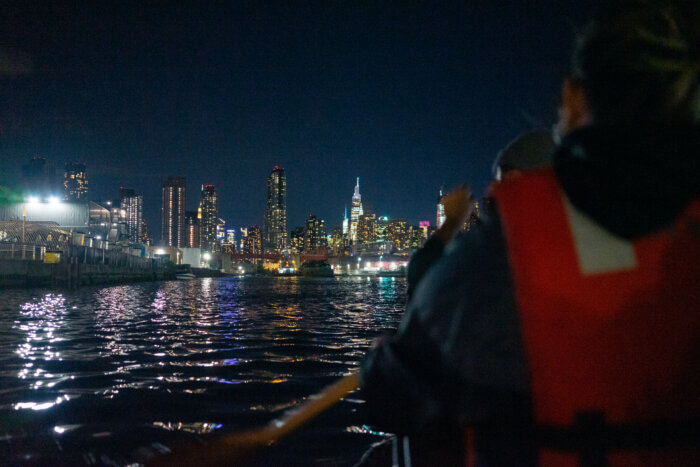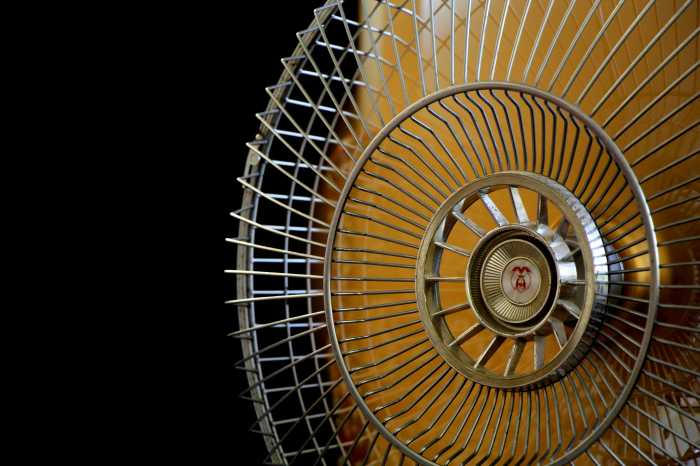All aboard!
Director and co-creator Dina Vovsi is taking audiences into an alternative, realistic universe with the second and final weekend of her new play, “River Watchers.” The immersive and innovative theatrical adventure brings audiences onto the waters of the Newtown Creek and 22 years into the future.
The story takes place in 2032, nearly 100 years after the 1950 explosion caused a massive oil spill in the Newtown Creek, which remains a heavily polluted industrial area many Brooklynites are striving to restore. Audiences pile into a canoe and push off into the canal, where they row themselves through the waterway as the story unfolds.
Experts from the Newtown Creek Alliance say approximately 12.9 of the 17 million gallons of oil have been recovered from the creek waters and the soils beneath Greenpoint. The creek is approximately 4 miles long and flows into the East River. Named a Superfund site in 2010, the Creek’s cleanup has been delayed by the EPA to 2032.
“We’ve seen horrifying things out there,” Vovsi said. “We’ve seen garbage, dead fish and even oil, but we’ve also seen wonderful things, like cranes and nature fighting back and coming back to life in the area.”
Vovsi, a 2023 Brooklyn Arts Council Grantee, took on the mission to amplify the voices of local heroes who advocated for and worked to restore the area by keeping a small captive audience on a canoe they themselves have to row in, to be entertained while hearing about environmental impact.
“Genius!” said one of the spectators.

“It’s a story that ends with a message of hope and that’s what we’re really excited about,” said Vovsi. “Just the communal act of the audience paddling is actually encouraging people to come together to hopefully change something and that’s what we want people to take away from it.”
Industrial activity in Greenpoint started in the mid-1800’s, including heavy shipping traffic and fossil fuel treatment. Fires were common and human waste, fuels, chemicals and unregulated byproducts were poured into the water. Brooklyn became one of the busiest and dirtiest commercial areas in the country.
One of the worst fires in Newtown Creek’s history set the Standard Oil Sone and Flemming ablaze in 1920. It took 3 full days before the fire was brought under control.
Not long after that, in 1925, Brooklyn Union Gas Company, now National Grid, purchased 115 acres in the neighborhood and built their largest facility, the Greenpoint Energy Center, abandoning a much smaller plant on the Gowanus Canal to be able to supply enough gas to satisfy thousands more customers.
The explosion of 1950 was assumed to have come from gas and oil fumes in the sewer, but wasn’t discovered until 1978 when a U.S. Coast Guard helicopter discovered a plume of oil flowing in the creek, originating from a bulkhead at Meeker Avenue. The 17 million gallon oil spill had seeped through the ground, covering 50 acres, 25 feet deep in and around Greenpoint — an area now known as the Meeker Avenue Plume.
Today, cleanup efforts have been underway for years, but still millions of gallons of oil sit in the plume under Eastern Greenpoint. The fear of locals today is not an explosion, but of cancer caused by carcinogenic chemicals in the oil and gas that still soak the soil. Greenpoint has one of the highest incidences in the city of leukemia in children and stomach cancer in adults.
“As individuals, I think we’re always struggling with how, how can I make an impact when it feels like nothing I do makes a difference?” said Vovsi. “That’s a huge question that these two characters especially raffle us in the play. In the end, I think starting locally and looking into what is affecting you, your neighbors, our health, or else, is really where we can have an impact.”
Performances will take place Thursday, Oct. 26 at 7 p.m., Friday, Oct. 27 at 7 p.m. and 8:30 p.m., and Saturday and Sunday, Oct. 28 and 29, at 7 p.m. Tickets are sold out for the season, but those interested are welcome to sign up on the waitlist for last-minute openings. According to Vovsi, it is very likely the production will come back next year.
























